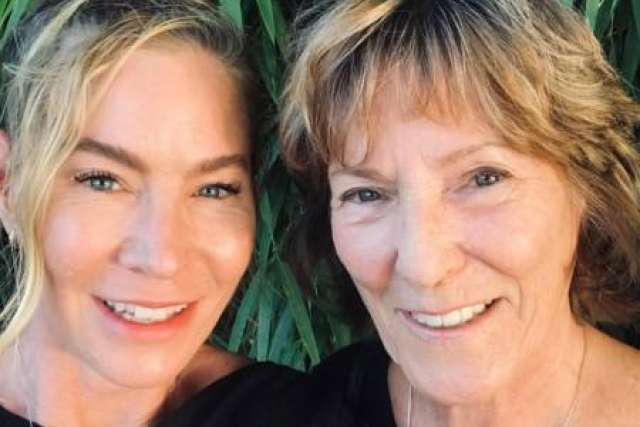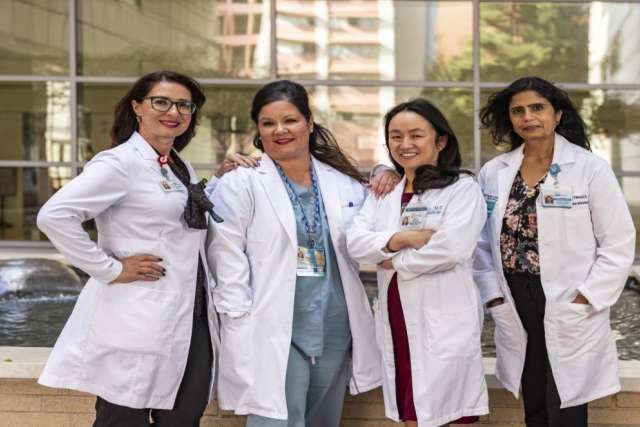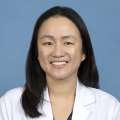Patients 65 and older represent 40% of hospitalized adults, yet their unique health care needs often are misunderstood or minimized.
Not at UCLA Health.
In October, UCLA Health was recognized by the Institute for Healthcare Improvement (IHI) with its highest designation for excellence in caring for older hospitalized patients: Age-Friendly Health System — Committed to Care Excellence.
UCLA Health’s commitment to providing exceptional care for geriatric patients, however, began years ago.
“This designation is formal recognition of the great work we’ve been doing caring for the geriatric population here,” says Grace Chen, MD, clinical chief of Geriatrics. “UCLA has had a nationally renowned Geriatrics Division for decades and has been innovative and collaborative in various aspects of care delivery of older adults across the health system.
“The goal now at UCLA is to ensure that all older patients receive geriatric individualized care consistent with IHI designation, regardless of who is providing that care,” Dr. Chen says.
A need for specialization
Studies have shown that seniors are hospitalized three times as often as those age 45 to 64, and they run a high risk for complications during hospitalization, including falls, delirium, adverse drug events, infection and death.
“Older patients are a vulnerable group that often doesn’t get the attention they need, and UCLA Health has shown this is important and has elevated that level of care and has made them a priority,” says Tina Mamais, MSN, RN, a geriatric clinical nurse specialist in the Center for Nursing Excellence at UCLA Health.
To receive IHI Age-Friendly designation, hospitals must demonstrate evidence-based excellence in serving older adults in four areas, referred to as the Four Ms: What Matters, Medication, Mentation and Mobility.
Over a 90-day period, about 2,700 charts were reviewed across Santa Monica UCLA Medical Center (SMMC) and Ronald Reagan UCLA Medical Center (RRMC). UCLA Health received an overall compliance score of 96% in the assessment of the 4Ms.
Mamais said she is not surprised UCLA Health scored so high.
“It’s that sustainability that nursing does. It’s embedded in their workflow,” she says, noting that nothing was added that the hospital system wasn’t already doing. “It’s just reframing our current state to have a more geriatric approach.”
She credits her counterparts, Anila Ladak, DNP, RN, a geriatric clinical nurse specialist at SMMC, and Lianna Ansryan, MSN, RN, a clinical nurse specialist at Resnick Neuropsychiatric Hospital at UCLA, for leading the efforts in their hospitals.
What matters most
Until last spring, Teddi Edwards was the picture of health. At age 75, the Palm Springs resident hiked in the mountains two hours a day, golfed weekly and could run rings around some 25-year-olds.
Then in March, Edwards started experiencing shortness of breath. By April, her symptoms included rattles on exhale. Her doctors in Palm Springs struggled to pinpoint her diagnosis. She was hospitalized in July with pneumonia, but when her symptoms didn’t abate, they were back to square one.
Edwards was admitted to RRMC in mid-November. By then, her oxygen level was dangerously low and she was coughing up fluid. Then she received a diagnosis: mucinous adenocarcinoma, a type of cancer found in the epithelial tissue, which lines the outer tissue of organs and blood vessels. The cancer is predominant in women and can be difficult to diagnose.
Until this year, it had been 50 years since Edwards was last hospitalized, she says. What matters most to her is to be surrounded by a friendly, optimistic care team.
“I love to have fun, and so I have fun with all of my nurses, my doctors; to me, that’s the most important thing. Life is short, so I try and enjoy it,” she says.

Edwards says she appreciates the personalized attention she receives from her nurses at UCLA Health.
“They’re just right here when I need them. They’re very conscientious,” she says. “I love that they all work together — if one is busy someone else takes over.”
Edwards’ daughter Ginger Wheller, a registered nurse herself, sings the praises of UCLA Health. What’s most important to her and her sister, she says, is open communication: listening to the family, answering their questions and explaining the plan of care to their mother.
“They went to great lengths to explain things to my mom. She even has a drawing of her lungs that one of the medical team drew to show her what’s going on,” Wheller says.
Comprehensive approach
UCLA Health’s geriatric focus is rooted in establishing evidence-based practices for older adults, protocols that were further elevated in 2016 when UCLA Health received NICHE (Nurses Improving Care for HealthSystem Elders) designation.
The Frailty Project, a screening protocol to identify risk factors in older patients, was launched the same year.
In 2017, UCLA Health convened its first Health System Geriatric Committee meeting. The committee serves as a forum for discussions related to process and outcomes, sharing best practices, engaging in collaborative problem solving and exposure to clinical experts in the field of gerontology. Participants include bedside nurses, nursing unit directors, geriatric clinical nurse specialists, physicians, pharmacists and social workers.
In October 2019, UCLA launched its first International Day of Older Persons observance, in which volunteers from UCLA’s People-Animal Connection and their canines visited senior patients to offer physical and emotional well-being. UCLA Health now observes the day on Oct. 1 each year.
“We’re really mindful of providing care from a comprehensive, holistic approach rather than just the individual disease condition our older patients are presenting,” Dr. Chen says.
Elder screenings
All UCLA Health patients age 65 and older are screened for depression, mobility and function upon admission to any of the UCLA hospitals. If patients score positive for depression, a social worker follows up with additional testing. Referrals for physical therapy and/or occupational therapy are recommended as needed for mobility impairments and limitations in activities of daily living.
Additional initiatives for hospitalized geriatric-age patients include a pharmacy initiative to ensure older patients are receiving appropriate medications and a delirium dashboard for all patients age 65 and older.
Processes are being developed to pass along these geriatric assessments collected during a patient’s hospitalization to the patient’s primary care physician.
“We’re trying to make the care for older patients in the UCLA health system as seamless and connected as possible,” Dr. Chen says.
Care for all ages
Edwards is receiving chemotherapy and says she sees daily improvement in her health. She’s grateful for the care she’s receiving at UCLA Health and says can’t imagine being anywhere else.
“It’s a well-oiled machine here. The doctors are amazing, everybody’s amazing. This is the best place to go if you’re any age,” she says.
Her daughter Wheller agrees. “UCLA is the best of the best — by far better than any hospital we’ve ever been to,” she says.
Find out more about geriatric medicine at UCLA Health.
Jennifer Karmarkar is the author of this article.




